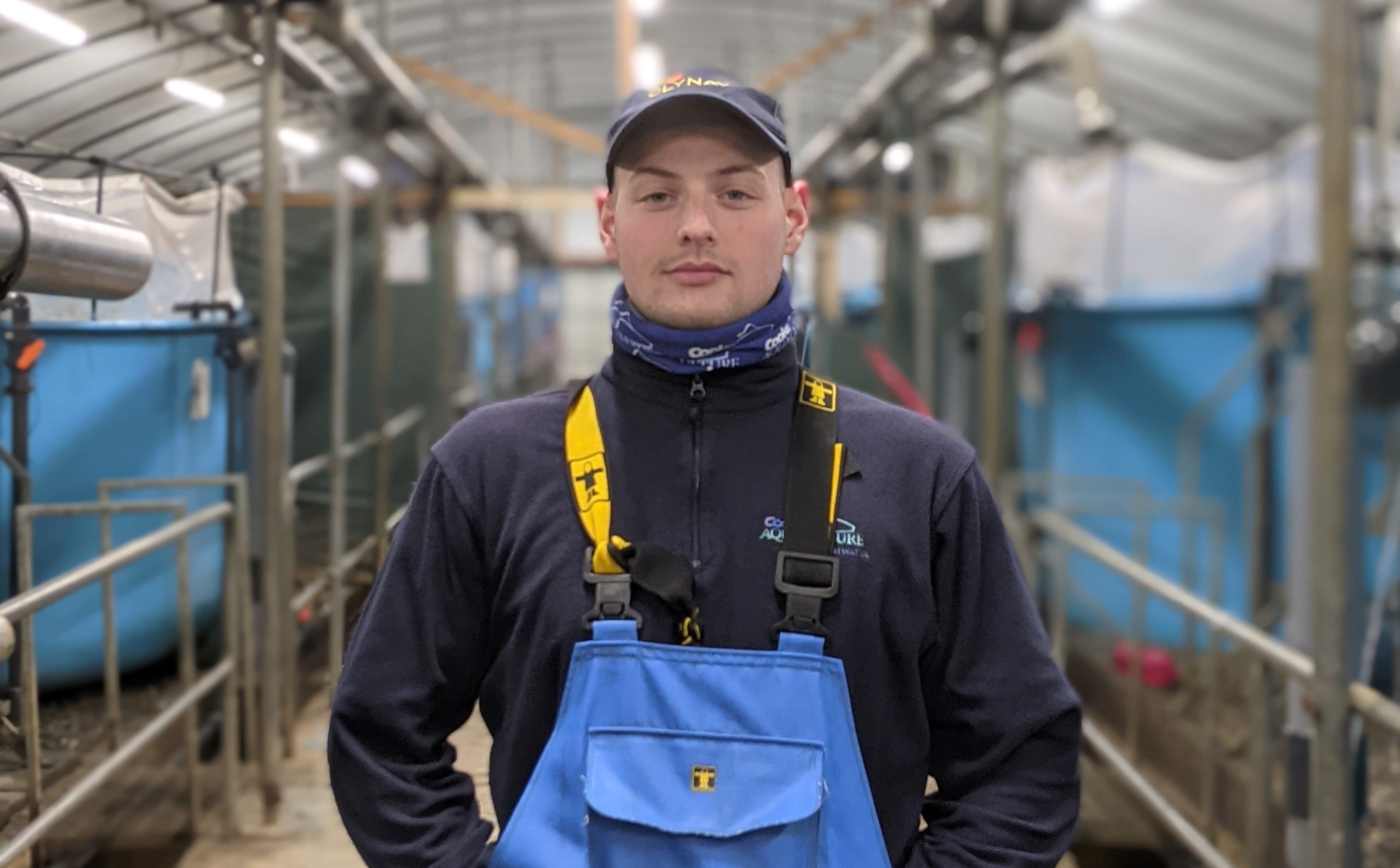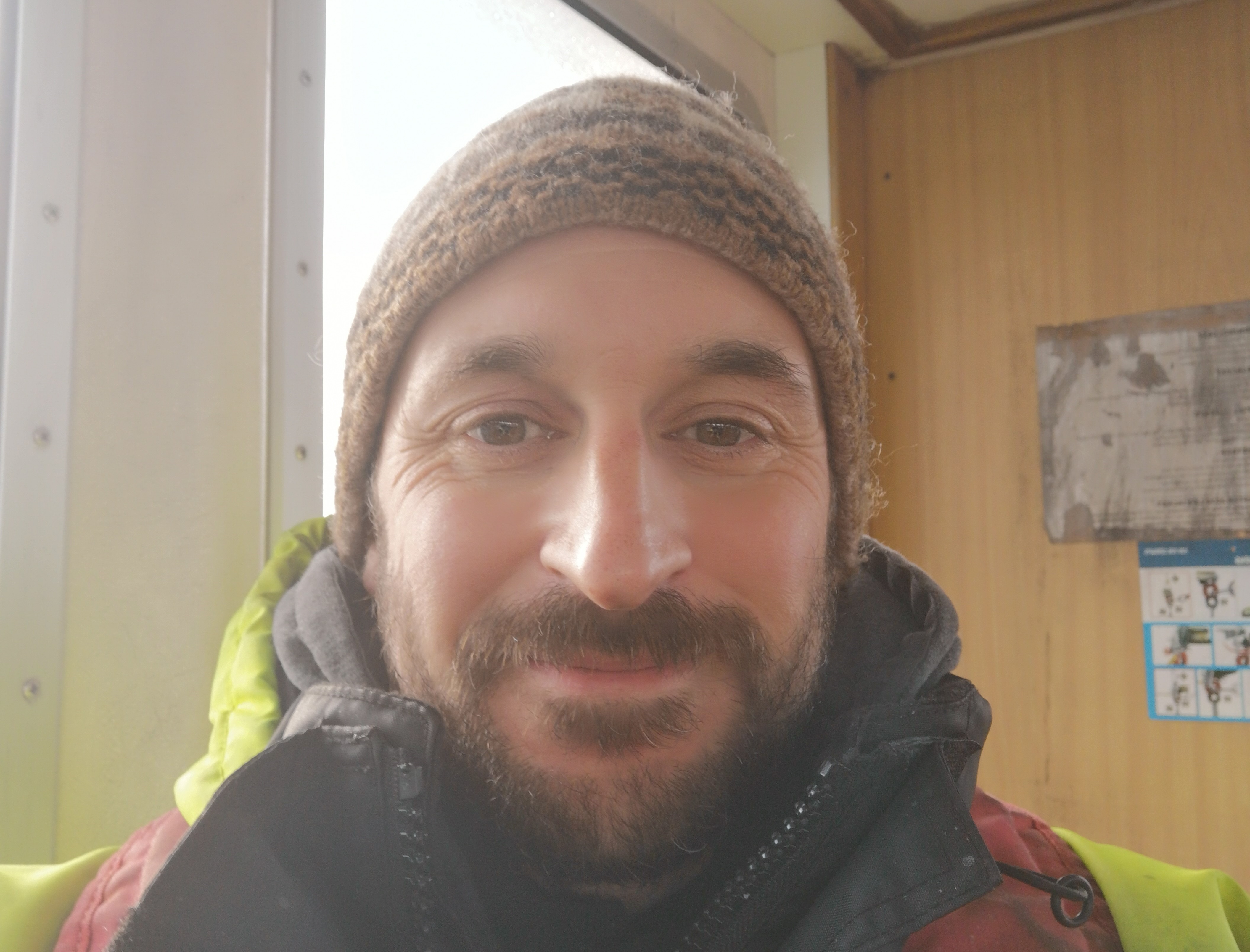
Harry Hamlin-Wright is the company Veterinarian for an aquaculture company and tells us about his career and how much he enjoys his job.
I’ve always been interested and passionate in fish management so I am enjoying my current role at the Ardtaraig hatchery on Loch Striven. It’s a freshwater, flow-through Atlantic salmon hatchery. We receive fertilised eggs twice a year, hatch and raise them in tanks, on land until they’re ready to go to sea. We’re at the top of a loch and it’s a stunning place to work.
The main things I do each day are fish husbandry, checking equipment, monitoring feed and oxygen to the fish and grading and vaccinating them. I also have responsibilities as fire marshal, forklift operator, fish care and training new staff.
Teamwork’s really important, and you have to be good at problem solving and working independently under pressure too. We all get on really well and are a great team, so working here is rewarding.
While the honours degree in marine biology I have is relevant to my job, I wanted to do something a bit more hands-on, so was delighted to be given the chance to do a Modern Apprenticeship. It’s a great way to improve your knowledge, skills and experience while you’re still working full-time on site.
I’m learning about team and site management, aquatic production, fish feeding and health care regimes and treatments, as there’s a big focus on fish health and providing the best care that you can. You sometimes have to be prepared to cancel personal plans at short notice, because the fish always come first.
The most rewarding part of the job for me is getting feedback from the sea site how chuffed they are with the fish we produce for them. Once we know the salmon are healthy and in great condition, it makes all the hard work worth it.


41-year-old Guy Tindall from Shetland has always had a love of the water, so starting his career as a commercial diver for Grieg’s Seafood was a natural first step into aquaculture. But after 10 years of working deep underwater every day, the physical strain was beginning to take its toll, and Guy decided to change career.
Guy said: “I enjoyed the diving, but things got tougher as I got older. When I started off, we worked in shallow nets of around 16 metres, but over time we moved towards bigger, deeper nets which accommodated a larger number of salmon. If you are diving deep, it puts more strain on your body and by the time I was 40, I knew that my diving days were effectively over and it was time to move on.”
Luckily for Guy, he knew people in the right places. He had been a diver at Greig’s site at Stenness in Shetland and knew the site manager well. One day he asked if there were any jobs going and his timing was perfect.
Guy said: “I think I caught my boss by surprise. At first he thought I was joking when I asked for a job, but I was aware that a few people had moved on and there was a shortage of hands. I got an interview and then landed the role of Aquaculture Technician looking after containment and biosecurity. One of the great things about aquaculture is you don’t need qualifications to get in. It’s very much a learn on the job type industry, with training and skills development provided along the way.”
After starting at the Stenness site, Guy did a Modern Apprenticeship in Finfish Aquaculture through NAFC Marine Centre UHI, now part of Shetland UHI, as well as various modules and tickets, including health and safety, first aid, sea survival, driving power boats and a range of other skills-based courses.
Guy explains what his current role looking after bio security and containment involves. He said: “I make sure all our boats, equipment and PPE are thoroughly disinfected, so everything is safe. The containment side is about making sure our cages, nets and grids are secure and maintained to keep our fish under control and safe from predators. I work closely with our dive teams, directing them to areas of the site that need maintenance, such as repairing nets or checking moorings. That’s where my 10 years of working as a diver definitely comes in handy.”
Reflecting on how technology has changed over the years in his line of work, Guy said: “In days gone by, divers just had a bottle on their back, a basic comms system and a piece of rope, but everything’s changed for the better nowadays. Different cables on the surface supply divers with air, comms and other essentials. A dive shack allows us to communicate with divers using high-definition cameras and advanced radio communications systems. We also use Remotely Operated Vehicles (ROVS) to reach deeper locations, such as the bottom of the nets or checking anchors. The ROVS can dive deeper for longer and have become an essential tool.”
Guy believes that working in aquaculture can be tough, but it can also be highly rewarding, with opportunities to specialise in different areas. He continued: “It’s hard work with many hours spent on site in all weather conditions. But it’s very satisfying seeing the fish develop and thrive, growing from young Parr up to adult Salmon. It’s important to love working outdoors and have a good attention to detail, particularly in my role.”
Like every industry in the rural sector, aquaculture has been affected by the COVID-19 pandemic, with fewer staff on each site and strict regulations governing social distancing and hygiene.
Guy said: “There are three teams that work the site, using two boats, so we’ve had to stagger our start and finish times to make sure we weren’t mixing with other teams. It’s been challenging, but the ability to be flexible is critical in fish farming.”
Guy’s employer, Grieg’s Seafood, has recently been sold to Scottish Sea Farms, but while this may have created some uncertainty initially, Guy believes that the sale is a positive step, providing opportunities and long-term stability.
He said: “It was a worrying time at first, but I think that we’re all feeling much more positive about the future now.”
Guy is currently focusing on looking after the health and security of his fish and relishing the opportunities that have come his way. He said: “I’m fortunate to have landed this role, and am focused on building my experience and skills at the moment. I’ll take each day as it comes and welcome any opportunities that are presented to me. I love working on this site, as we have a great team and I’m very happy where I am.”
While 57-year-old James MacDonald from Stornoway might not be most people’s idea of a typical trainee, he has turned out to be an ideal candidate for the Modern Apprentice training programme.
After leaving school with no qualifications, James worked in a warehouse and the retail industry for 30 years, before deciding to try something new. He changed careers and joined the Scottish Salmon Company in their hatchery station, then moved on to become Production Manager with Hebridean Mussels, part of The Loch Fyne Group, two years ago. It was here he was offered the opportunity to do a Modern Apprenticeship.
James said “I completed the SCQF Level 7 Modern Apprenticeship in Aquaculture through NAFC Marine Centre UHI, which is now part of Shetland UHI. Having come from a retail background, I found it really useful to be able to learn in my new workplace, doing everyday tasks. I could then explain situations better to my assessor, as we were in a real-life work environment”.
Despite his rural location and COVID restrictions, was delighted with the support he got from NAFC UHI, his training provider. He said “They really were fantastic – if I ever had a question, I could email or call the team at the college, and they were quick to get back in touch. I uploaded my assessments online, which made things easier with feedback when we couldn’t physically meet.”
James explained that his current role at the Bernera site focuses on mussels and continued: “The spat stock is naturally occurring and settles on ropes we put in the water. Over 3 years, they grow to sale size and are then harvested via boats, cleaned, graded and packed, ready for retail. Our work is seasonal – we don’t process mussels from the end of May to mid-September as there are toxins and algal blooms in the water at that time of year. Instead, we harvest from September to May around the orders that we get.”
Although James may be working in a sector that’s new to him, his existing management experience still helps. He said “I manage a team of seven, with four shore-based and three on boats. We do all the processing on-site, from harvesting, processing, packaging, and packing onto lorries bound for Stornoway, where they will be taken to the mainland. We also take samples of water and keep records electronically, testing weekly for toxin levels, running our own internal audits and providing samples for Food Standards Scotland.”
He continues: “We have a small number of staff on site and customer orders need to be processed by a certain time to meet deadlines, so we need to make sure our team works well together. This is a rural setting, so it can be hard to find new staff, but we tend to pick the right people as they stay with the business a long time. Every day is different here. Sometimes you’re working indoors, sometimes outdoors in the wind, rain or sunshine, but it’s never dull!”
James recognises that having the Modern Apprenticeship qualification will help his career in the long run, saying: “My company are really supportive with training, encouraging us to get as much as possible. I’m so glad I did the Modern Apprenticeship programme as it’s helped me immensely, especially coming from another sector. It’s fantastic having officially accredited aquaculture qualifications that are recognised throughout the industry.”
